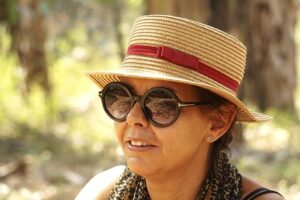Fitness and Yoga Teachers
Sport for Mental Health
Meet Ada Ibezi Abolou, a certified Fitness Coach and Lakhsara Dié, a certified coach and Yoga teacher.
Both living in Lomé, they will speak about their job and the link between physical activity and mental health.

Please tell us a little bit about yourself:
My name is Ada Ibezi Abolou. I am a British-born Nigerian. I am passionate about Education and Total Fitness and Wellbeing.
I am a UK qualified Primary School Teacher with over 16 years successful teaching experience.
I am also a certified Fitness Coach and ran a fitness social enterprise aimed at women and girls in the UK.
I hold a Master’s in Education, Health Promotion and International Development (EHPID), which reflects my passions.
How did you become so passionate about sports and fitness?
I became passionate about sports and fitness when I discovered how much of a positive impact it had on my mental health and wellbeing.
Staying active positively affected not just my physical health but my mental health. Physical fitness made me feel better and helped me improve both my physical and mental health.
Can you explain how and what can be done to improve mental health?
It is important that mental health is openly talked about and made a priority in Africa. It should not be a taboo subject or something that should be hidden. People should be encouraged to talk more openly about their emotions as much as they are their physical health.
Facilities/infrastructure like parks for physical activities should be made readily available for all ages from children through to adults.
People have physical health just like they have mental health so it is important that they are educated about mental health so they better understand the benefits of physical health on their mental health.
What advice or recommendations would you give a person who wants to improve their mental health?
- Make their mental health a priority.
- Talk to someone about their feelings. It’s good to talk about our emotions.
- Stay active regularly – walking, dancing, running, stretching, martial arts.
- Do the things that usually bring you joy – reading, singing, watching a movie.
- Stick closely to their regular daily routines – waking up, going to bed, meditating.
- Seek medical advice from professionals.
You have encouraged the work of the Foundation. Can we expect to see you at the Hospital helping patients and Outpatient in the future?
Absolutely! I’m thrilled to discover that the hospital provides a gym facility for outpatients. They understand that physical health impacts on mental health and vice versa.
I would be delighted to help patients and outpatients with their physical fitness, in the future.

« There is a voice that does not use words. Listen! » _ Jalal Al-Din Rûmi (1207-1273)
Lakhsara Dié was born in Paris in 1965 to a Danish mother and a Mauritanian father. She is a certified coach and Yoga teacher. Since 2001, she has also been working as a consultant in the context of development in Africa.
The practice of yoga (breathing, meditation and physical exercises) has positive effects on mental health especially in the management of pain, stress, anxiety and depression.
If you practice yoga you are most likely familiar with this very particular state of well-being that you feel after a beautiful session. You are calm, connected, clear and aligned. You feel light and spacious. And maybe you realize that you just freed yourself from a black cloud that was floating around you and constantly following you. This is known as the yogic state. Indeed, yoga is a unique practice that unites the body, mind and soul.
Yoga works as a self-soothing technique in that it alters the stress response system, helping to “tame” and calm the nervous system. In this way, the mental benefits of yoga are observed with the reduction of stress through a decrease in the levels of cortisol (stress hormone) in the body
Traumatic experiences, by their true nature, are painful, dark and distressing and can ultimately turn into “anxiety and loss of reference points” that will become entrenched in the mind and body experience. In the long run, this feeling of “anxiety and loss of reference points” anchors and amplify and turns chronical. Thus, a resistance to the experience of thinking, of welcoming emotions or physical sensations develops by causing a complete stop of the mind-body experience. This is when the person disconnects from himself.
The effects of yoga on mental health are diverse and varied. Many scientific studies prove, nowadays, that meditation, among other yoga techniques, contributes to the balancing of mental health and promotes better self-awareness. Yoga as a mind-body practice that provides a gateway to access the more primitive reptilian part of the brain (responsible for survival and self-maintenance), and thus allows people, traumatized and in survival mode, to relearn to cope with unpleasant internal experiences in a healthy and reassuring environment.
Indeed, we decorate the interior of our house, we clean it regularly in order to feel good. But too often we forget to do the same within our body that is no less than a precious temple. Sometimes it is good to decorate our interior by offering our body and mind a bath of youth, a bouquet of flowers. What if the bouquet of flowers to decorate our inner temple was merely a regular physical yoga practice, a breathing or relaxation session or even the three combined?
Our body is our best ally and it is constantly in communication with us. But do we pay enough attention to the wordless voice of our mind-body? Or rather do we wait for the voice of existential pain to anchor in the physical body and thus become the loudest?


